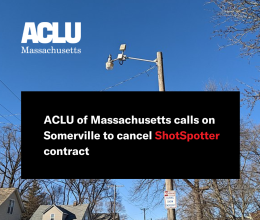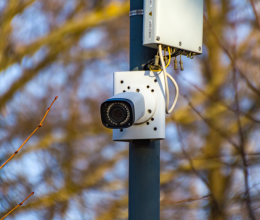
The petition comes in Moore v. United States, a criminal case where police installed a hidden surveillance camera on a utility pole without getting a search warrant and used it to record a Massachusetts home over an uninterrupted eight-month period
The American Civil Liberties Union and the ACLU of Massachusetts, along with the law firms of Elkins, Auer, Rudof & Schiff and Thompson & Thompson PC, today filed a petition with the U.S. Supreme Court urging the court to decide whether long-term police use of a surveillance camera targeted at a person’s home is a Fourth Amendment search.
The petition comes in Moore v. United States, a criminal case in which, without getting a search warrant, police installed a hidden surveillance camera on a utility pole and used it to record the activities at a Massachusetts home over an uninterrupted eight-month period. After a federal district court held that such sweeping surveillance of activities surrounding a home is a Fourth Amendment search requiring a warrant, the U.S. Court of Appeals for the First Circuit took the case en banc. The First Circuit, however, deadlocked on the question of whether long-term pole camera surveillance of the home is a Fourth Amendment search. Federal courts of appeals and state supreme courts have divided on the question, and the new petition urges the Supreme Court to set a clear rule that will protect Americans’ privacy against invasive surveillance of their activities and associations at their homes.
“This technology allows police to secretly watch and record highly invasive details of our private lives, from when we leave and return home, to what we carry with us when we do, to who visits us, and when. Without a warrant requirement, nothing stops police from using these small, cheap cameras to watch anyone’s — or everyone’s — homes without limit,” said Nathan Freed Wessler, deputy director of the ACLU’s Speech, Privacy, and Technology Project. “As the cost of such surveillance falls and its use by law enforcement expands, the need to resolve whether the Fourth Amendment poses any constraint has become all the more urgent.”
“Pole cameras may sit on public utility poles, but they target deeply informative locations around our most intimate spaces: our homes,” said Matthew Segal, legal director at the ACLU of Massachusetts. “This case presents an important and recurring question about privacy rights in the face of advancing surveillance technologies. The highest court in Massachusetts has already held that continuous, long-term pole camera surveillance targeted at a home can amount to a search under the Massachusetts Constitution, and the Supreme Court should take up this case in order to make clear that the U.S. Constitution offers that same kind of protection.”
“This case is about much more than the months-long secret surveillance of our client’s activities and associations at her home,” said attorney Linda Thompson, who represented defendant Daphne Moore in the trial court. “Until the Supreme Court acts, people across the country will remain vulnerable to law enforcement’s claim of unfettered authority to surveil any of us, for as long as they wish, with no judicial oversight. In this case, the government targeted the home of a community pillar — a lawyer, respected judicial clerk, devoted church member, and a grandmother raising her grandkids — and then cherry-picked images from months of unceasing surveillance in an effort to support unwarranted criminal charges against an innocent person.”
In 2018, the Supreme Court issued a landmark Fourth Amendment ruling in Carpenter v. United States, which was argued by the ACLU. The court held that the government must get a warrant before accessing days’ or weeks’ worth of a person’s sensitive cell phone location data. As explained in the new ACLU petition, long-term pole camera surveillance of the home is at least as invasive as cell phone tracking over time. But because lower courts have struggled with how to apply the court’s Carpenter decision to this particular police practice, the Supreme Court’s guidance is needed.
The ACLU is urging the Supreme Court to resolve the split among lower courts and to again guarantee the Fourth Amendment’s critical protections against unfettered or suspicionless surveillance in a digital age.
Moore v. United States is a part of the ACLU's Joan and Irwin Jacobs Supreme Court Docket.
A copy of the filing is available here: https://www.aclu.org/legal-document/petition-writ-certiorari-2
This press release can be found online here: https://www.aclu.org/press-releases/aclu-urges-us-supreme-court-hear-challenge-warrantless-pole-camera-surveillance






